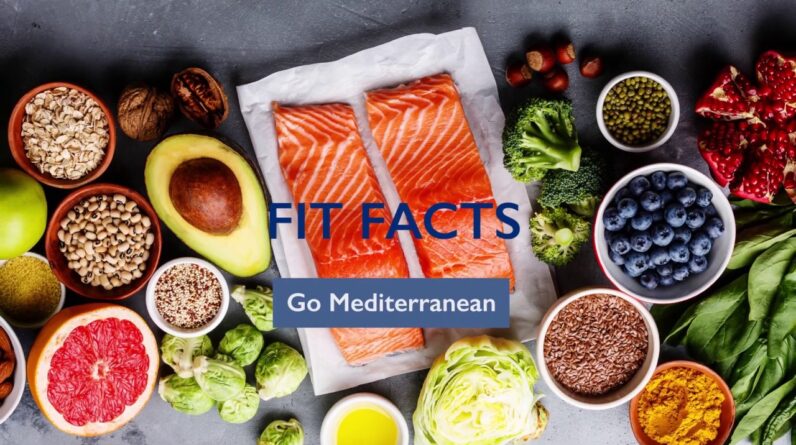
In a recent study published in The New England Journal of Medicine, the benefits of a Mediterranean diet were explored in depth. The study found that this particular diet, rich in olive oil, nuts, beans, fish, vegetables, and fruit, not only has numerous health benefits but also reduces the risk of heart disease by a staggering 30%. What’s even more surprising is that these benefits were observed in individuals who were already at high risk for heart disease and were taking medication to lower their cholesterol levels. The findings of this study have astonished experts and shed light on the true magnitude of the benefits that a Mediterranean diet can provide.
While many of us may think that we have a healthy diet, this study shows that we may not be doing enough to truly reap the benefits of a Mediterranean diet. The participants in the study filled out a questionnaire about their eating habits before the study began, and many were surprised to find that their diet did not align with the recommendations of a Mediterranean diet. For example, while they may have incorporated some olive oil, fruits, and vegetables into their diet, they were not consuming adequate amounts of legumes, fish, and other key components. The study also revealed that contrary to popular belief, individuals can consume large quantities of nuts and olive oil without gaining weight, as these items are highly filling. Overall, this study highlights the importance of adopting a true Mediterranean diet and the significant impact it can have on improving health outcomes.
Benefits of the Mediterranean Diet
Overview of the study
Recently, a study published in The New England Journal of Medicine has revealed the immense health benefits of following a Mediterranean diet. This diet, which primarily consists of foods such as olive oil, nuts, beans, fish, vegetables, and fruits, has long been touted as a healthy way of eating. However, the study has shed light on the magnitude of the benefits associated with this diet.
Magnitude of the benefits
What is truly astonishing about the study’s findings is the significant reduction in the risk of heart disease among participants who followed the Mediterranean diet. These individuals, who were already at a high risk for heart disease and taking medications such as statins to lower their cholesterol, experienced a 30% reduction in the occurrence of heart attacks, strokes, and deaths from heart disease. This reduction is on par with the benefits observed when high cholesterol levels are treated with statins. The study’s results clearly indicate that the Mediterranean diet is as effective, if not more so, in preventing cardiovascular events.
Comparison to statins
The fact that the Mediterranean diet can rival the benefits of statin medications is truly remarkable. Statins have long been regarded as the gold standard in reducing cholesterol levels and minimizing the risk of heart disease. However, the study’s findings suggest that adopting a Mediterranean diet can produce similar, if not better, outcomes. This is particularly noteworthy because it means that individuals have the option to improve their cardiovascular health through dietary changes rather than relying solely on medications.
Publication in the New England Journal of Medicine
The fact that the study was published in The New England Journal of Medicine adds to its credibility and importance. This prestigious medical journal is renowned for publishing groundbreaking research and advancing our understanding of various health-related topics. The publication of this study in such a reputable journal lends further support to the benefits of the Mediterranean diet and emphasizes the significance of its findings.
Challenges of Following the Mediterranean Diet
Misconceptions about a healthy diet
One of the challenges of adopting a Mediterranean diet is dispelling misconceptions about what constitutes a healthy diet. Many individuals believe that they already have a nutritious diet and may be resistant to making changes. However, the study’s findings demonstrate that even individuals who considered their diets to be healthy were not following the principles of the Mediterranean diet. Therefore, it is crucial to educate people about the specific elements of this diet and the potential health benefits associated with it.
Unusual aspects of the Mediterranean diet
Another challenge lies in the fact that the Mediterranean diet may seem unusual or unfamiliar to some individuals. The emphasis on foods such as olive oil, nuts, and legumes, as well as the moderate consumption of wine and dark chocolate, may be perceived as unconventional. However, these components are integral to the diet and contribute to its overall health benefits. It is important to overcome any initial hesitation or skepticism about these foods and embrace their potential positive impact on health.

This image is property of i.ytimg.com.
Specific Recommendations of the Mediterranean Diet
Increased consumption of nuts and olive oil
One of the key recommendations of the Mediterranean diet is to consume more nuts and olive oil. Both of these foods are rich in healthy fats and can contribute to improved heart health. The study found that individuals who ate all the nuts they wanted, excluding meals, did not gain weight. This suggests that nuts, when consumed in moderation, can be part of a balanced and healthy diet. Similarly, the liberal use of olive oil in cooking and as a condiment provides additional health benefits.
Moderate consumption of wine and dark chocolate
Contrary to popular belief, the Mediterranean diet includes moderate consumption of wine and dark chocolate. Red wine, when consumed in moderation, has been shown to have antioxidant and anti-inflammatory properties that can benefit cardiovascular health. Similarly, dark chocolate with a high cocoa content offers health benefits such as improved blood pressure and enhanced mood. It is important to note that moderation is the key, and excessive consumption of these items can negate their positive effects.
Fish and legume intake
The Mediterranean diet places a strong emphasis on consuming fish, especially fatty fish such as salmon, at least three times a week. These types of fish are rich in omega-3 fatty acids, which have been linked to numerous health benefits, including reduced inflammation and improved heart health. Additionally, legumes such as lentils and chickpeas are a staple in the Mediterranean diet. They provide a valuable source of plant-based protein, fiber, and essential nutrients.
Importance of tomato sauce
Another specific recommendation of the Mediterranean diet is the regular consumption of tomato sauce. Tomato sauce is typically made by simmering tomatoes slowly in olive oil with garlic and onions. This flavorful sauce can be enjoyed with various dishes such as pasta, rice, or vegetables. The inclusion of tomato sauce in the diet has been associated with additional health benefits, although the extent of its importance is still unclear.
Critiques and Questions Surrounding the Diet
Late adoption of the diet by the US
One critique that has been raised is the late adoption of the Mediterranean diet by the United States. The study’s findings have sparked criticism regarding why it took so long for a formal study to be conducted on the diet’s effectiveness. The Mediterranean diet has been popularized for its health benefits for many years, and some individuals question why extensive research was not conducted earlier. However, it is important to acknowledge that conducting a rigorous study involving thousands of participants following specific dietary guidelines is inherently challenging.
Feasibility of conducting a rigorous study
The feasibility of conducting a rigorous study on the Mediterranean diet should not be underestimated. Convincing thousands of individuals to adhere to a specific diet for an extended period of time is a daunting task. Many people are resistant to making drastic changes to their eating habits or may simply be unwilling to participate in a long-term study. These challenges make it difficult to gather comprehensive data and draw definitive conclusions.
Replacing unhealthy foods or truly beneficial
Another question surrounding the Mediterranean diet is whether the inclusion of certain foods is truly beneficial or if they are simply replacing unhealthy alternatives. For example, it is unclear if the positive health outcomes associated with olive oil, nuts, and fish are due to their inherent benefits or if they are merely replacing less healthy options. Further research is needed to better understand the specific mechanisms behind the health benefits attributed to the Mediterranean diet.
Uncertainty regarding specific components
There is still some uncertainty regarding the specific components of the Mediterranean diet that contribute to its health benefits. While the diet as a whole has been shown to be beneficial, it is not yet clear which individual foods or combinations of foods are primarily responsible for the observed effects. The Mediterranean diet is a complex and varied eating pattern, making it challenging to pinpoint the exact elements that play a significant role in improving health outcomes.
Implementing the Mediterranean Diet
Importance of understanding the entire diet as a package
When implementing the Mediterranean diet, it is crucial to approach it as a comprehensive package rather than focusing solely on specific foods or components. The diet’s efficacy lies in the combination and overall pattern of consumption rather than any singular ingredient. Understanding and embracing the principles of the Mediterranean diet in their entirety can maximize its potential health benefits.
Available resources and guidelines for following the diet
Fortunately, there are numerous resources and guidelines available to help individuals adopt the Mediterranean diet. Many reputable health organizations provide detailed information and meal plans to facilitate the transition to this way of eating. These resources can offer assistance in navigating the various food choices, portion sizes, and cooking methods associated with the diet.
Quiz to assess adherence to the diet
For those interested in assessing their adherence to the Mediterranean diet, quizzes and self-assessment tools can be valuable resources. These assessments evaluate an individual’s current eating habits and compare them to the principles of the Mediterranean diet. They can provide personalized feedback on areas where improvements can be made and help individuals fine-tune their dietary choices.
Conclusion
The Mediterranean diet undeniably offers significant health benefits, as demonstrated by the recent study published in The New England Journal of Medicine. The magnitude of the benefits, particularly in reducing the risk of heart disease, is truly remarkable. However, there are challenges associated with adopting the Mediterranean diet, including misconceptions about healthy eating and unfamiliarity with certain aspects of the diet. Despite these challenges, the specific recommendations of the diet, such as consuming more nuts and olive oil, moderate consumption of wine and dark chocolate, and incorporating fish and legumes into meals, are attainable and can make a positive impact on health. Further research is necessary to address lingering critiques and uncertainties surrounding the diet. Implementing the Mediterranean diet requires a comprehensive understanding of its principles and utilizing available resources and guidelines. By considering personal dietary habits and making necessary adjustments, individuals can embrace the Mediterranean diet and improve their overall health.




